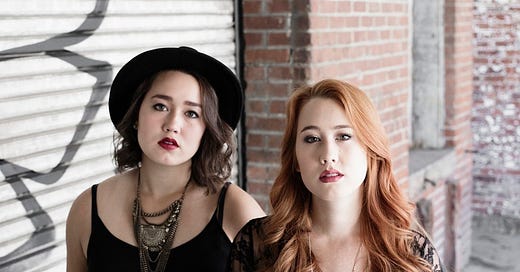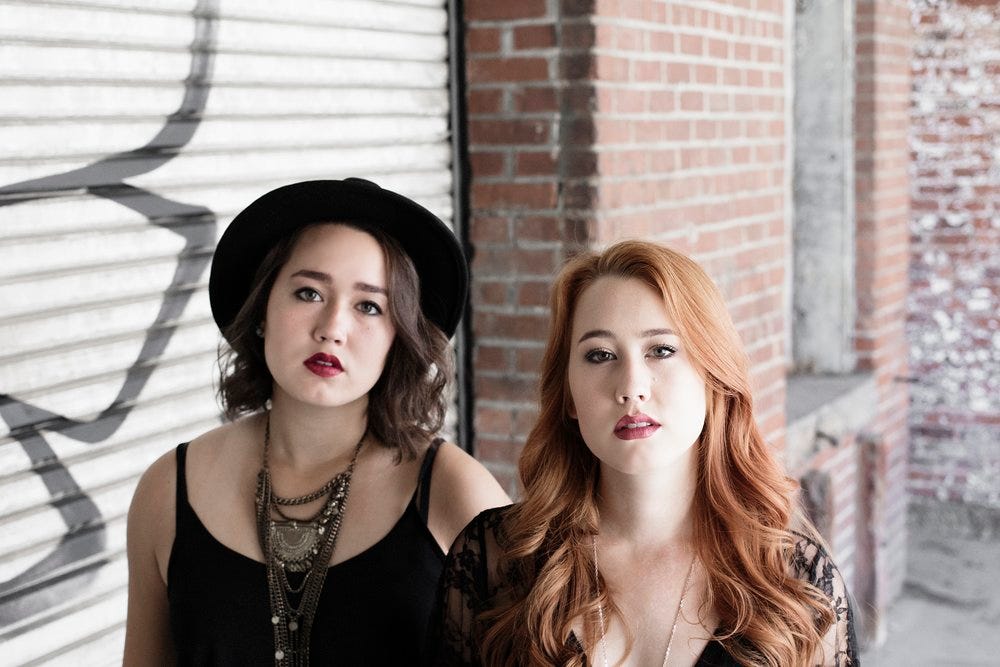"What ARE You?" Experiences Mixed-Race Asians Have All Had
Our mom is Korean.
Our dad is English, Scottish, Dutch and Swiss/German.
We are m i x e d .
"What are you?!"
Chloe: I was 16 when I started getting this question. I was at my new high school in Nashville and had left class to deliver something to another room. There was another girl in the hallway—she was a grade below me. She stopped me as I walked by and said something along the lines of, "I've seen you in this hall a few times and I've always wondered—what are you?" It was strange, but I knew immediately what she was trying to ask. She was trying to place my ethnicity, but couldn't put her finger on it.
"I'm part Korean!" I responded. It was an innocent inquiry, driven by pure curiosity. Sure, the question was a little weird and the phrasing a bit odd, but nonetheless I found it amusing that someone was willing to approach a complete stranger in an empty hallway because they were that curious. She nodded her head as my appearance started to make sense in her eyes.
"Ahhh okay. That's cool! Well, you're really pretty."
"Oh, umm, thank you..!" She was quite stunning herself. Possibly even mixed race. I never asked.
Since then, I've probably been asked that question 40+ times. It starts with a squint and a head tilt, followed by a fumbling of words, trying to form the most polite way to ask me my race—almost always a bit of an awkward encounter. We were recently having a conversation about this with our dad, explaining to him how we'll be running errands or getting groceries and complete strangers will come up and ask, "What are you?" He got this quizzical look on his face.
"I don't get it...why do they ask you that?" We laughed. Because yeah, for most people that would seem like a really strange question. But when your race has been a conversation starter your entire life, you know exactly what they're asking.
"They want to know our ethnicity," we explained. Now, is it anyone's business what our racial makeup is? No. Do we have a problem with people asking? No, not usually.
We can't speak for everyone, though. In some instances, people may as well say, "You're like a rare exotic animal and I just want to stare at you!" because sometimes that's how it feels. And it's hella awkward (but seriously, sometimes they actually call you exotic and you're like WTF? Cringing just thinking about it!). But there will be other times we're glad they asked because it gives us an opportunity to share about ourselves—to share some of our story.
Chloe: This was a recurring theme when we were little. Whenever our mom would come to school to help out in the classroom or chaperone a field trip, my classmates would immediately ask her, "Are you Christine's mom?" because they had just assumed she was parent to one of my Chinese classmates.
She would always gently respond, "Nope, I'm Chloe's mom!" which was followed by a chorus of "Really? Are you sure?" and "Chloe, this is your mom?" They didn't understand how I could have an Asian parent.
As I grew older and entered middle school, my peers became more vocal about telling me I didn't look Asian. Many went as far as accusing me of lying about being mixed. So I stored a photo of my mom in my flip phone for the days I felt I needed to prove myself to someone who tried to tell me there was no way my mom was Asian. That shut them up pretty quick.
Taylor: We were constantly defending our 'Asian-ness'. When you grow up looking into the face of your Asian mom, while outsiders continue to decide for you that you are not Asian, you feel like you're being tossed back and forth in a raging current with nothing to cling to. So when a piece of driftwood floats by, you grasp onto it for dear life. For us, that piece of driftwood arrived in the form of DNA test results.
Our mom was adopted. She has never met her biological parents. She doesn't know who they are or what they look like. Her adoptive parents were told, "she is believed to be of mixed race". Because she has lighter brown eyes and hair and a larger build than most Asian women, she thought her father was American. Last year she decided to get a DNA test. When the results came in, she was surprised to learn: she was 99.8% Asian. Chloe and I were ecstatic. We've always wanted to be more Asian. More definable. Less ambiguous.
But ultimately, the DNA results didn't change anything. It didn't make us look more or less Asian. Sure, maybe we felt a little more Asian. But it didn't change the way people see or treat us.
Chloe: I've had people crack demeaning Asian jokes in front of me because they don't realize I'm half Korean. Everyone laughs, but I'm sitting there thinking of all the stories my mom has told me. Stories about kids pulling their eyes back and mimicking "Chinese" accents.
For so long I've been told I don't look Asian that now it's even hard for me to see it. Many days I'll still stand next to my mom, squish my face against her cheek and say, "We look just alike, right?" or I'll ask Taylor, "Do you think I look Asian? I don't really see it." Maybe I do look mixed, maybe I don't. I want both my races to be apparent in my appearance. But just because that's what I want doesn't mean that's what is.
FYI—this isn't meant to be some sob story. A "poor Chloe doesn't look Asian enough" story. If you're reading this thinking, "Don't you realize you have more privilege the whiter you look in this country? Stop complaining." I one hundred percent realize that. I'm sharing this for other mixed people who have one side that dominates their appearance, even if they feel a strong connection to both (or their less dominant side). When you're mixed, it's totally possible to look more white but feel more Asian, and vice versa. How you physically look isn't necessarily how you identify, and how you physically identify is not always how you identify culturally. Being bi-racial is complex.
Hell, I still don't really know how I fully identify. Maybe that's just part of the joy of being mixed.
*This is the first piece in a series we are doing on racial identity. Stay tuned!
-Chloe & Taylor




